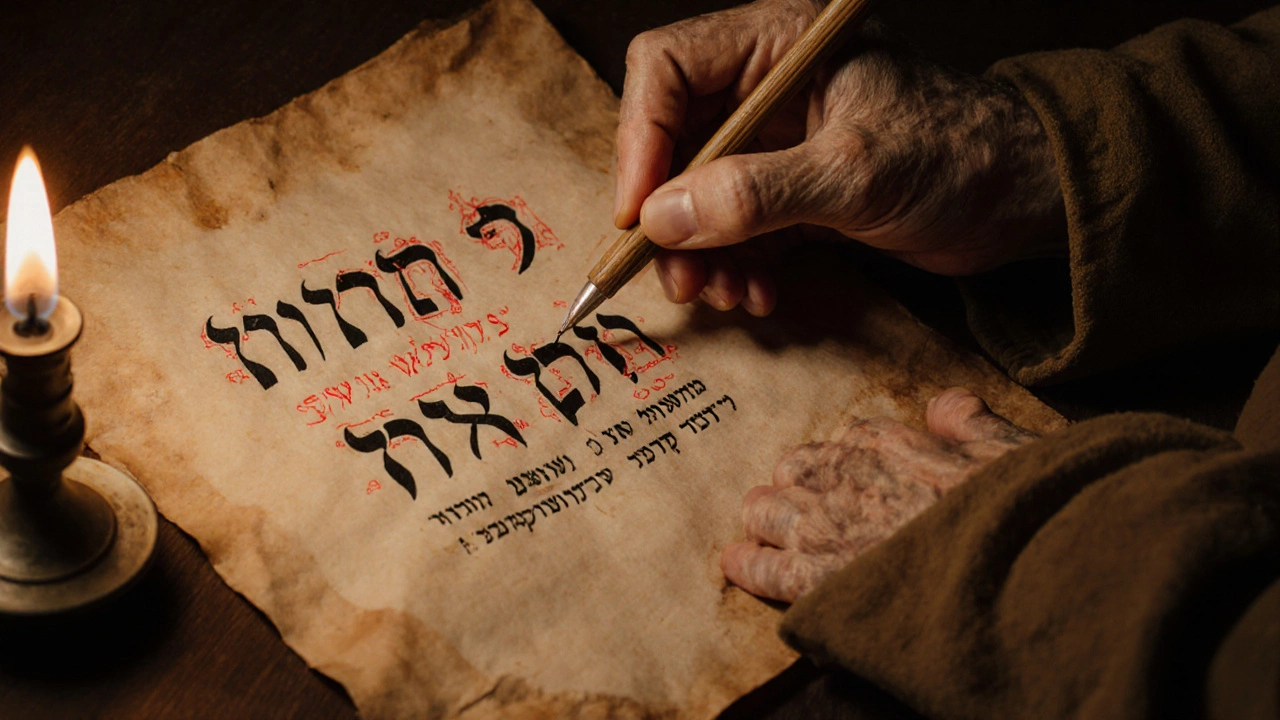When scholars talk about the “real” name of the deity worshipped by ancient Israelites, they usually point to YHWH, also written as Yahweh and Jehovah, the four‑letter Tetragrammaton that appears in the oldest Hebrew manuscripts. That tiny cluster of letters has haunted theologians, linguists, and fiction writers for centuries, sparking endless debate about pronunciation, meaning, and reverence.
The Mystery Behind the Tetragrammaton
The name YHWH shows up in the Masoretic Text of the Hebrew Bible without vowels. Ancient scribes placed placeholder vowel points ("a", "e", "i", "o", "u") to remind readers not to pronounce it aloud, leading to the later vocalisation Yahweh. Jewish tradition eventually replaced the spoken form with Adonai ("Lord") during prayer. This practice mirrors a broader cultural pattern: sacred names often become taboo, prompting indirect references.
How Ancient Cultures Recorded Divine Names
Across the ancient world, the act of writing a god’s name was both a blessing and a risk. In Mesopotamia, priests inscribed the Sumerian god Anu on clay tablets, believing the act could summon his protection. In Egypt, the name Ra was carved into temple walls, accompanied by spells to guard against misuse. These examples show that the power of a name was taken seriously, shaping how societies chose to record-and sometimes conceal-those words.
The Evolution of God’s Name in Hebrew Tradition
Early Israelite inscriptions, such as the Kuntillet Ajrud altar, reveal a fluid use of divine titles. Scholars date the first clear appearance of the four‑letter sequence to the 10th‑9th centuries BCE. By the time of the Babylonian exile (6th century BCE), the Israelites faced a linguistic crossroads: their language was being written in a script that lacked vowel markers, and foreign cultures were constantly reminding them of the power of names.
One pivotal moment arrived with the development of the Masoretic vocalisation system (7th‑10th centuries CE). The Masoretes deliberately paired the consonants Y‑H‑W‑H with the vowel points of the word Adonai, creating the hybrid form Yahowah. Later Christian translators rendered this as “Jehovah,” a combination that persists in many English Bibles. While modern scholarship leans toward “Yahweh” as the more accurate reconstruction, the debate is still alive in academic circles and popular fiction alike.
Parallel Divine Names in Other Ancient Religions
When you step outside the Hebrew world, you discover a rich tapestry of sacred names that share similar mysteries. Below is a quick look at how five major traditions label the supreme being.
| Tradition | Name | Meaning | First Recorded Use |
|---|---|---|---|
| Hebrew | YHWH | "I Am" or "He Causes to Be" | 10th century BCE (Kuntillet Ajrud) |
| Islam | Allah | "The God" (Arabic definite article + ilāh) | 7th century CE (Qur'an) |
| Hinduism | Brahman | Universal Reality, the ultimate principle | 5th century BCE (Upanishads) |
| Zoroastrianism | Ahura Mazda | "Wise Lord" | 6th century BCE (Gathas) |
| Greek | Zeus | Sky and thunder god, ruler of Olympus | 8th century BCE (Homeric hymns) |
Notice the recurring theme: each name carries a claim to ultimate authority, yet the societies that worshipped them often treated the utterance of the name with caution. The parallels are fertile ground for historical‑fiction writers looking to weave authentic religious intrigue into their stories.
What Historical Fiction Can Teach Us About the Search
Authors of historical fiction are in a unique position. They can blend the rigor of scholarship with the narrative drive of storytelling. When a novelist decides to reference Jehovah or Allah in a dialogue set in 1st‑century Palestine, they must respect both the linguistic realities of the period and the modern sensitivities surrounding those words.
A good practice is to let characters use the titles they would actually employ-like “Adonai” in synagogues or “Lord” in private prayer-while the narrator or a scholarly footnote can clarify the underlying divine name. This approach satisfies readers who crave authenticity without alienating those who might find direct usage offensive.
Practical Guide for Writers: Using Divine Names Responsibly
- Research the original language. Identify whether the source text was Hebrew, Aramaic, Greek, or another language, and note the consonantal form.
- Consider the audience. A mainstream novel may opt for “the Lord” while a niche historical‑mythic work can safely include “Yahweh” with an explanatory note.
- Show reverence through context. Characters often avoid speaking the name aloud, substituting it with an epithet. Use this to build tension or illustrate piety.
- Mind modern sensitivities. Avoid sensationalizing sacred names; focus on their cultural weight.
- Provide a glossary. A short appendix listing names, meanings, and pronunciation helps readers stay immersed.
Following these steps keeps your narrative grounded and your world‑building believable.
Checklist for Accurate Representation
- Identify the primary divine name used in the period (e.g., YHWH for pre‑exilic Israel).
- Verify the script and vowel‑pointing system of the era.
- Note any taboos on vocalisation and substitute appropriately.
- Cross‑check parallel names in neighboring cultures (e.g., El, Baal, Ahura Mazda).
- Include a brief author’s note explaining your choices.
Frequently Asked Questions
What does YHWH actually mean?
Scholars generally read the Tetragrammaton as “Yahweh,” which likely derives from the Hebrew verb “to be.” The name therefore conveys a sense of eternal existence: “I am that I am.”
Why do some translations use “Jehovah”?
Early Christian scholars combined the consonants Y‑H‑W‑H with the vowel points of “Adonai,” producing the hybrid “Yehowah,” later Latinised to “Jehovah.” Modern scholars prefer “Yahweh,” but “Jehovah” remains in many traditional Bibles.
Is it acceptable to write the name of God in fiction?
Yes, if you handle it with care. Explain the historical context, avoid gratuitous repetition, and consider using the culturally appropriate substitute (e.g., “the Lord”) for scenes where reverence is key.
How do other religions treat the spoken name of their deity?
Many traditions share a taboo. In Islam, the name “Allah” is spoken freely, yet the 99 names of Allah are often recited with reverence. In Hinduism, “Brahman” is a philosophical concept more than a spoken prayer, while “Vishnu” or “Shiva” are used openly in chants.
Can I use the divine name as a character’s nickname?
It’s risky. Using a sacred name as a nickname can be seen as disrespectful unless the narrative clearly shows why the character earned that moniker (e.g., a prophet who is believed to embody the divine will).

